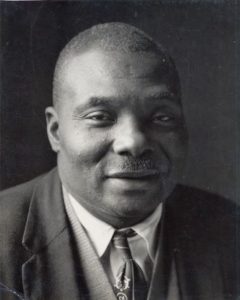
Esau Jenkins
*Esau Jenkins was born on this date in 1910. He was a Black businessman, preacher, and community organizer.
Jenkins grew up during Jim Crow segregation, when educational opportunities were not readily available. He was the only child of Peter Jenkins and Eva Campbell, from Johns Island, South Carolina. He was forced to end his formal education in the fourth grade to help supplement the family’s income. At age seventeen, he married Janie Jones. Of their thirteen children, seven survived, all earning college degrees.
In the 1940s, Esau and his wife, Janie, used their money from farming and selling produce to purchase several buses. These buses were used to transport their children and others on the Sea Islands to school in Charleston and further their education. In 1951, he established Haut Gap High School on Johns Island. Currently, Haut Gap is an advanced studies magnet middle school. Jenkins’ buses also transported workers to jobs in the Charleston area. During the bus rides, Jenkins and his wife would teach their adult passengers the information needed to pass the literacy exam so that they could become registered voters.
Jenkins realized the need for a systemic approach to adult education. At the invitation of Septima Clark, he traveled to Highlander Folk Center to meet with Myles Horton to discuss the need for adult education and citizen classes on the Sea Islands. The first citizenship school was established on John's Island at the Progressive Club. This co-op was started in 1948 by Jenkins and other families on Johns Island. Notable individuals participated in workshops, including Dr. Martin Luther King, Jr. The co-op housed a community grocery store, gas station, recreation area, sleeping rooms, and classroom space, allowing residents to trade goods and services to help each other in need. The school was so effective that it served as the model for other citizenship schools established throughout the South to teach adult education, basic literacy, and political education classes and workshops, resulting in thousands of citizens becoming registered voters.
Jenkins founded the Citizens Committee of Charleston in 1959 and the C.O. Federal Credit Union in 1966. This credit union helped to further the economic advancement of the community. Residents could secure low-interest loans to purchase homes, businesses, and vehicles, and even send their children to college. Jenkins was also one of the founders of Rural Mission, Inc. This initiative provided services for migrant and seasonal farm workers on the Sea Islands. In or about 1970, Rural Mission, Inc. received $96,000.00 through the Office of Economic Opportunity with the assistance of Senator Ernest F. Hollings to start a health clinic at Bethlehem United Methodist Church to serve the five sea islands of Charleston County: Johns Island, James Island, Wadmalaw Island, Edisto Island, and Yonges Island.
In February 1972, the health clinic became a separately incorporated entity known as Sea Island Comprehensive Health Care Corporation, a comprehensive health care center for the Sea Island residents. He and his wife owned and operated a fruit and vegetable stand, a fleet of buses, a motel, and a restaurant in Charleston, SC, and Atlantic Beach, SC. Jenkins was known for his iconic 1966 Volkswagen deluxe station wagon, which he used for his work in the community and throughout the South. On the vehicle's back panels was Jenkins' motto: “Love is Progress, Hate is Expensive.”
In 2014, the Jenkins family donated the vehicle's back panels to the Smithsonian National Museum of African American History and Culture to become part of one of the permanent exhibits entitled “Defining Freedom, Defending Freedom: The Era of Segregation.” The Smithsonian, the Jenkins family, and the Preservation Society of Charleston hosted the send-off of the bus artifacts to the Smithsonian on June 1, 2014. This event was included in the Piccolo Spoleto Festival, and several hundred attended.
All local Charleston news outlets covered the story via interviews and articles about the event. The Historic Vehicle Association and the College of Charleston's Historic Preservation and Community Planning BA Program were instrumental in preserving the Volkswagen bus. In September 2019, the bus was the 26th vehicle added to the National Historic Vehicle Register. Esau Jenkins died on October 30, 1972. He has received many posthumous awards, including having a bridge, street, and health clinic named in his memory.